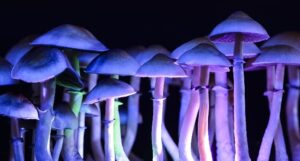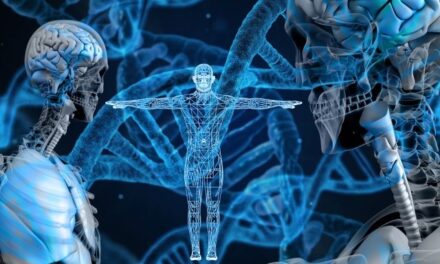An exciting therapeutic renaissance is occurring in mental health treatment. One that’s long overdue and sorely needed. Once-vilified psychedelic drugs are resuming clinical trials after a half-century hiatus from medical research. Early studies are proving that psychedelic drug treatments offer superior results for many mental health disorders, and have great potential to alleviate the mental health epidemic sweeping the globe.
What are psychedelic drugs?
 Psychedelics is a name coined in the late 1950s for what was then a new class of drugs including LSD, Psilocybin (the active ingredient in magic mushrooms), DMT, MDMA and others. These drugs act on the serotonin 2A receptors (which are highly concentrated in the frontal cortex), inducing an experience that is characterized by depersonalization (the loss of a sense of self), synesthesia, and other altered states of consciousness.
Psychedelics is a name coined in the late 1950s for what was then a new class of drugs including LSD, Psilocybin (the active ingredient in magic mushrooms), DMT, MDMA and others. These drugs act on the serotonin 2A receptors (which are highly concentrated in the frontal cortex), inducing an experience that is characterized by depersonalization (the loss of a sense of self), synesthesia, and other altered states of consciousness.
During the 1950s, and into the 1960s, there had been a very active period of research into these compounds. But when psychedelics were embraced by the counterculture, a moral panic ensued and the backlash led to a halt in research. In recent years, however, there has been a renaissance of research into these drugs. Picking up where research left off a half a century earlier, there is more and more optimism about their use as a therapeutic tool. Research is proving that these drugs, when administered in a supportive therapeutic environment, help people deal with a myriad of mental health issues.
What are some practical applications of psychedelic drugs?
While its important to point out that psychedelics aren’t a panacea for all mental health, ongoing research is starting to prove that specific compounds are quite effective at treating specific conditions. For instance MDMA (more commonly know as ecstasy), has tremendous efficacy in treating post-traumatic stress disorder. According to Tim Ferriss, trials have found that after a single session of psychotherapy with MDMA, 60% of the subject population no longer qualify as someone someone diagnosed with PTSD (according to the CAPS-5 assessment). And this goes up to 80% after two sessions.
 Other mental health conditions once thought to be intractable or treatment resistant with current psychiatric treatments, are also seeing early positive outcomes with psychedelic drug therapy. These include conditions like treatment-resistant depression, depression in palliative care, chronic anxiety, obsessive-compulsive disorder (OCD), drug addiction, and anorexia nervosa (the psychiatric disorder with the highest mortality rate).
Other mental health conditions once thought to be intractable or treatment resistant with current psychiatric treatments, are also seeing early positive outcomes with psychedelic drug therapy. These include conditions like treatment-resistant depression, depression in palliative care, chronic anxiety, obsessive-compulsive disorder (OCD), drug addiction, and anorexia nervosa (the psychiatric disorder with the highest mortality rate).
Studies
- In a 2014 study by Johns Hopkins University, 80% of participants remained abstinent from nicotine 6 months after being on psilocybin therapy.
- In a 2016 study on the use of psychedelic drugs by terminally-ill patients, 80% experienced reduced depression and anxiety.
- In a 2017 clinical study (reported by MAPS) on using ibogaine to treat opioid dependence, 50% of participants had stopped using opioids after 1 month.
These studies are not only extremely encouraging in absolute terms, they represent superior results to existing treatment options. For nicotine addiction, for example, current therapies produce a success rate of 35% (at best). The impressive results in a steady succession of clinical studies using psychedelic drug treatment is causing a lot of former skeptics to take notice.
Tim Ferriss – author, investor, podcaster, and advocate for clinical research into psychedelic drugs.
Michael Pollan – journalist, professor of writing and journalism at Harvard and UC Berkeley, and author of seven New York Times bestselling non-fictions, including How To Change Your Mind: What The New Science Of Psychedelics Teaches Us About Consciousness, Dying, Addiction, Depression, And Transcendence. Since publishing his book on Psychedelics, in which he experimented with LSD and psilocybin as part of his research, Michael has been an outspoken advocate for continued exploration and research of these mind-altering drugs for the purpose of treating a host of mental illness.
Breaking Obsessive Patterns In The Brain
The one thing aforementioned mental health disorders have in common, is they may in fact be related to common obsessive patterns of brain activity that cause obsessive behavior. Psychedelic drug treatments essentially, seem to reboot the brain, thereby breaking these destructive patterns.
According to Michael Pollan, who experimented with psychotherapy using LSD and psilocybin as part of his research for his book, you acquire a kind of distance from yourself. So addicts, for example, see the destructiveness of their behavior in a way they hadn’t seen before. The other thing that seems to happen, says Michael Pollan, is an experience of what’s sometimes called ego dissolution. What happens to a lot of people who are depressed or addicted is they lose their connection to other people, to nature, even to their earlier selves. Instead, the connection to the substance or destructive behavior becomes stronger than anything else. Psychotherapy seems to break this negative connection. It breaks the negative feedback loop, allowing the person to reconnect beyond themselves. Its essentially a kind of reset for the brain.
 So if a traumatic experience can potentially reset your psychology in a destructive way, psychotherapy using psychedelic compounds has the potential to reset or reverse your psychology back to the norm. Psychedelics seem to reboot the brain, breaking the rigidity that people are stuck in. Certain grooves of thought that they can’t get out of – for example loops of recrimination that depressed people play (“I’m not worthy of love I’m worthless”) or the addict (“I can’t get through life without a drink”) – psychedelics seems to break those patterns. They temporarily shake things up in a way similar to electroshock therapy (ECT), that temporarily disrupts patterns that are really destructive. Since the brain is plastic, the same connections may not form in the same way, which creates an opportunity for the reset.
So if a traumatic experience can potentially reset your psychology in a destructive way, psychotherapy using psychedelic compounds has the potential to reset or reverse your psychology back to the norm. Psychedelics seem to reboot the brain, breaking the rigidity that people are stuck in. Certain grooves of thought that they can’t get out of – for example loops of recrimination that depressed people play (“I’m not worthy of love I’m worthless”) or the addict (“I can’t get through life without a drink”) – psychedelics seems to break those patterns. They temporarily shake things up in a way similar to electroshock therapy (ECT), that temporarily disrupts patterns that are really destructive. Since the brain is plastic, the same connections may not form in the same way, which creates an opportunity for the reset.
That said, as Michael Pollan points out in the interview, psychedelic drug treatment is probably only useful in treating illnesses at one end of the spectrum. The set of illnesses including depression, anxiety, and obsession are all characterized by a kind of rigidity of thought. Brains that are stuck in patterns of mental behavior that are on a loop and not progressing. At the other end of the spectrum are a number of disorders characterized by brains that are too unstuck. Conditions such as schizophrenia and personality disorders, for example, are unlikely to see benefits from psychedelic drug treatment, and may even have adverse effects from such treatment.
Psychedelics, used responsibly and with proper caution, would be for psychiatry what the microscope is for biology and medicine or the telescope is for astronomy. (Stanislav Grof)
Urgent Need For New Innovations In Mental Health Care
Needless to say, there’s a mental health crisis in the United States and worldwide. Statistics suggest that rates of depression are rising around the world. Globally, depression is now the leading cause of disability according to the World Health Organization. Suicide rates in the United States, according to the CDC, are up dramatically over the last two decades. The statistics are astonishing, and to date, the tools at our disposal to treat mental illness are not very good. SSRIs (the most commonly prescribed antidepressants), are the last major innovation in mental health care. But they go back 40 years, and both therapists and patients are very dissatisfied with them. So there is a desperate need for new tools and approaches to treating mental health.
And the need goes beyond the personal and social level. Economic necessity is also a key reason we need to develop new mental health solutions. The simple truth is this: the global economy can no longer bear the enormous costs that mental health epidemics wreak on the already strained government finances. The statistics are staggering.
- The World Economic Forum estimated (in 2018) that mental health disorders cost the global economy $1 trillion per year in lost productivity.
- a Lancet Commission report estimates that by 2030 the total economic costs from mental health disorders will reach $16 trillion.
As health-related costs skyrocket from the proliferation of mental illness, our healthcare systems are being taxed beyond their limit. Depression, addiction, and other endemic mental health issues exact a tremendous amount of resources we simply can’t afford. And to add insult to injury, much of the current spending on these mental health issues is virtually wasted. Billions of dollars are spent, with very low treatment success rates.
 So if status quo isn’t working, we need to spend smarter. We need to pioneer better treatments for hard-to-treat mental health disorders. And with the renaissance of research into psychedelics, we have this opportunity. We have the opportunity to prevent the horrific personal, social and economic costs that mental illness is wreaking on society. We have the opportunity to launch a new advancement within the healthcare sector that will potentially revolutionize the treatment of mental illness. The psychedelics renaissance shows every indication of representing such a development.
So if status quo isn’t working, we need to spend smarter. We need to pioneer better treatments for hard-to-treat mental health disorders. And with the renaissance of research into psychedelics, we have this opportunity. We have the opportunity to prevent the horrific personal, social and economic costs that mental illness is wreaking on society. We have the opportunity to launch a new advancement within the healthcare sector that will potentially revolutionize the treatment of mental illness. The psychedelics renaissance shows every indication of representing such a development.
Tim’s Final Thoughts and Words Of Caution
Tim Ferriss believes we’re in a potentially beautiful position right now. The resurrection of psychedelic compounds to their rightful place as a tool for treating mental health can do a lot of good socially, culturally and scientifically. But we have to proceed with caution. While psychedelic compounds can alleviate the suffering for a lot of people, irrational exuberance and the haphazard use by amateurs has the risk of slowing and even derailing this valuable research. He says he’d encourage people who see the great potential in these compounds to temper their enthusiasm before they go looking for a shaman or start self-experimentation. Instead, support scientific research and only seek guidance from a qualified professional when undertaking psychedelic-assisted therapy. Tim finishes the interview, “be optimistic, support the science, and pump the breaks.” Good advice.
Investing In The Burgeoning Psychedelics Sector
So how can you support the science AND profit from this exciting renaissance in mental health therapy? As new studies are undertaken and encouraging developments continue to emerge in psychedelic research, estimates for the potential size of the market continue to grow. Ballpark numbers are well into the billions of dollars. This creates great opportunities for smaller companies entering the sector.
At the same time, it also creates a potential loss of revenue for Big Pharma. The problem for Big Pharma, is many of these psychedelic therapies are one-and-done. They remedy the underlying problem. This isn’t as profitable as selling antidepressants which often, just mask the issue and never really fix the problem. As they say in business, “your best customers are return customers”.
Nevertheless, as this fledgling sector in mental health treatment grows, larger companies will be forced to increase their budgets in psychedelic research or risk getting left behind. Plus, as selling opioids becomes a bigger and bigger liability due to multi-billion dollar lawsuits, large pharma companies will be looking to divest of such drugs for better alternatives.
Of the 4 investment ideas below, the first is one such Big Pharma company looking for alternatives to the opioid products that they currently market. The other 3 are smaller, early participants in the psychedelics space.
Johnson & Johnson, via its subsidiary Janssen Pharmaceutica, is performing groundbreaking work with the ketamine-derived medicine Spravato. In March 2019, J&J’s hard work paid off when the FDA approved Spravato for treatment-resistant depression. This landmark approval is unique in that ketamine is well known to have hallucinogenic properties.
MindMed is primarily focused on using ibogaine and LSD to treat disorders such as opioid addiction and attention deficit hyperactivity disorder (ADHD). The company made headlines in early 2020 when it was revealed that Kevin O’Leary, of ABC’s hit show Shark Tank, and former Canopy Growth CEO Bruce Linton, were investors in MindMed.





